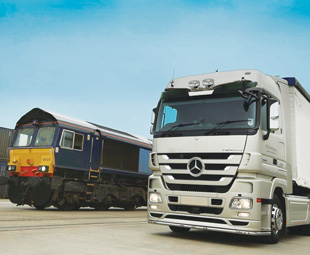How could rail influence the cost of transport?

VIC OLIVER discusses why the general cost of transport in South Africa is too high and how government’s plans for rail could influence this
The extra-heavy commercial vehicle industry has enjoyed a tremendous growth in South Africa over the past 20 years and today transports the bulk of all goods within the country and to neighbouring states.
The abolishment of the permit system that restricted the transportation of goods by road (which was in place to protect the transport of goods by rail and the inability of rail to provide an efficient, reliable and safe mode of transport) has contributed to the growth of long-distance road transportation.
The transfer of the majority of freight from rail to road has, however, resulted in an expensive mode of freight movement around the country and to our neighbouring states. With the present poor state of the South African economy and the unacceptably high unemployment rate, overseas business investors are desperately needed to grow the economy.
Many of the potential investors have, however, complained that the cost of doing business in the country is too high, with one of the contributing factors being that our general cost of transport is very high when compared to competing countries.
To reduce the cost of transporting freight in South Africa we have to find the most efficient and cost-effective mode of transporting our goods and the correct balance between road and rail.
For the long-distance, high-bulk segment of the market, rail can be more efficient, so plans have been put in place to improve our rail system … and we have recently witnessed the purchase of some new locomotives.
Should the rebuilding and growth of the rail system be seen as a threat to heavy-vehicle operators? Perhaps not; it should rather be seen as a business opportunity to work together in providing a means to reduce the cost of doing business in South Africa, which, in turn, will grow the economy. This will benefit the industry as a whole.
There will be many opportunities for long-distance road hauliers to expand and possibly improve the financial status of their businesses, if they see rail transportation as a partner and not a threat.
In my opinion, there is place for both the rail and road-freight industries to operate in the country, provided that road transport of goods and people is not restricted by the reintroduction of a permit system, or changes to the National Road Traffic Act that would be detrimental to the road-freight hauliers.
The playing field needs to be levelled and customers must have the choice of which system they want to use to move their goods or people.
The South African government must recognise that road transportation is unquestionably a vital part of the solution and that it must do all that it can to assist road carriers to continue to operate successfully.
One of this country’s most respected commercial vehicle industry authorities, VIC OLIVER has been in this industry for over 50 years. Before joining the FOCUS team, he spent 15 years with Nissan Diesel (now UD Trucks), 11 years with Busaf and seven years with International.
Published by
Focus on Transport
focusmagsa



